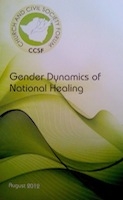
The Gender Dynamics of National healing research paper casts a gender lens to the broader spectrum of transitional justice in post independence Zimbabwe. It brings forth an important framework for discussion on the gendered face of transition politics and proffers key recommendations around the development and implementation of mechanisms, institutions and policies that take into consideration the differential effects of violence on women, men, boys and girls.
Central to the study is the observation that the impact of conflict and the post conflict responses affects men and women differently. As a result of inherent gendered power relations women’s experiences of violence and needs for justice have to be addressed differently. Women experience violence all the time but violence escalates during times of war and civil strife, and constitute a major obstacle to development, peace and security. Women suffer during times of conflict both as primary and secondary victims of violence. They are primary victims when they are attacked and secondary victims when people they are close to are attacked; they witness the abuse and nurse injuries emanating from the violence. However, sometimes women are not just victims but they instigate and acquiesce to violence. Post conflict processes should thus address national healing in the context of that dynamic.
Globally confronting past human rights violations has remained a contentious and contested issue in post conflict societies including Zimbabwe. In the aftermath of violence emphasis has largely been placed on political settlements, economic recovery and reconstruction. The healing of nations has often been relegated to peripheral status and is often downplayed by post conflict governments. The national healing discourse is further made complex by the debates on defining national healing, on what constitutes healing, on how the process should be conducted and the evaluation of whether a nation has healed or not. The broad term given to such mechanisms is transitional justice which encompasses justice, truth, reconciliation and guarantees of non repetition through trials and truth commissions established to deal with the legacy of human rights abuses and violations during a society’s transition to democracy.
The research indicates that the absence of a gender approach in transitional justice has perpetuated inequality and led to the exclusion of women in post conflict processes. The pursuit for a gender lens to a process wrought with its own complexities demands an analytical perspective into the conceptualization, formulation and implementation of national healing mechanisms. The study concludes that the world over, transitional justice processes are neither comprehensive nor conclusive in restoring and healing communities after violent conflicts. However, integrative methods of criminal tribunals, truth commissions, traditional mechanisms and the strengthening of the domestic the justice delivery system are key components in any attempted to reconcile societies. The absence and limited participation of women in the formulation and implementation of transitional justice mechanisms deny women the opportunity to define healing in their context and to ensure that gender justice is achieved.
Recommendations centre on the need for state and non state actors to take advantage of the growing gender sensitivity and inclusivity in the formulation of laws and policies reflected in the new constitution of Zimbabwe. The new constitution of Zimbabwe has specific provisions that address the marginalization and exclusion of women in previous policy frameworks. Among some of the key elements are Guarantees of gender equality and protection of women and men from violence in the public and private sphere, the promotion of gender balance through equal participation and equal representation in all institutions and agencies of government in response to the 50/50 call by the SADC protocol, the proposed establishment of a Gender Commission designed to monitor all issues concerning gender and ensuring that gender equality and gender justice is achieved. The study applauds the provision for the establishment of the National Peace and Reconciliation Commission (NPRC) as a key institution that has the potential to ensure post conflict justice, healing and reconciliation in a gender sensitive manner.

